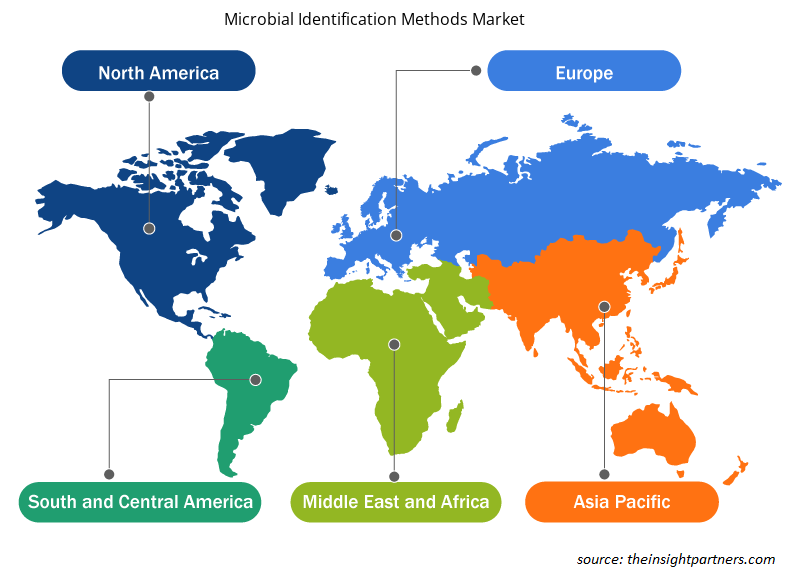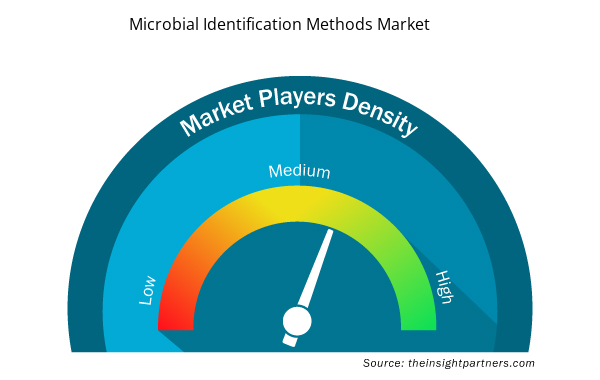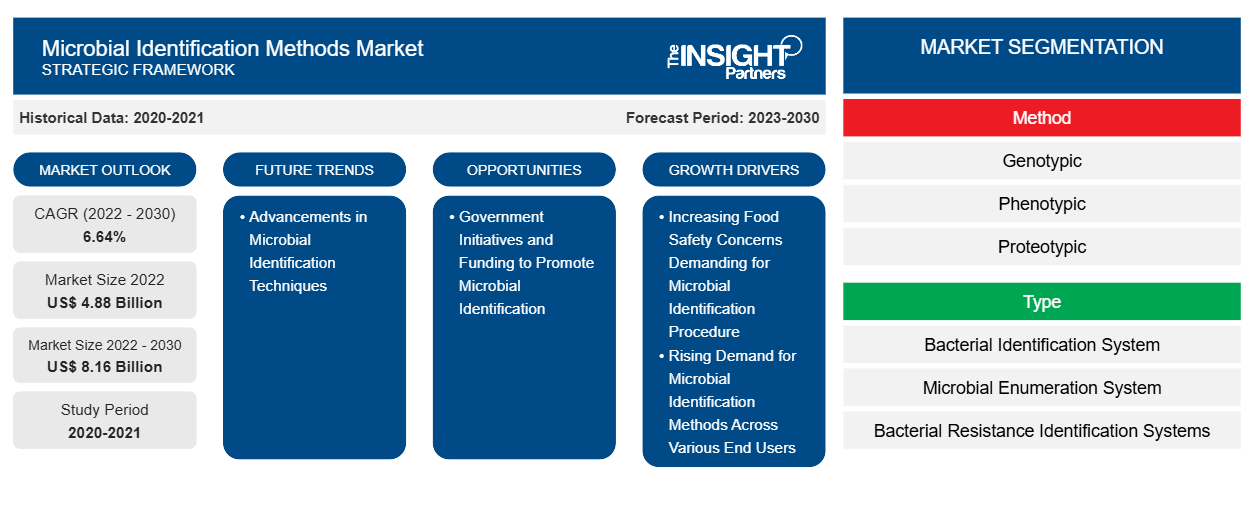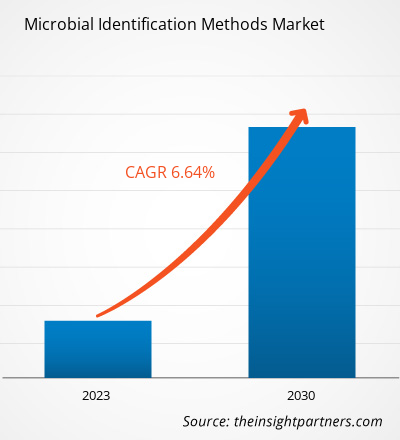[研究报告] 微生物鉴定方法市场规模预计将从 2022 年的 48.8285 亿美元增长,到 2030 年预计将达到 81.6474 亿美元;预计 2022 年至 2030 年的复合年增长率为 6.64%。
市场洞察和分析师观点:
微生物可以通过三种主要技术进行鉴定——基因型、蛋白质型和表型。推动微生物鉴定方法发展的关键因素是食品安全问题日益严重,要求微生物鉴定程序,以及各种最终用户对微生物鉴定方法的需求不断增加。然而,自动化微生物鉴定系统的高成本以及由于监管框架复杂导致的新微生物诊断测试审批过程延迟阻碍了微生物鉴定方法市场的增长。
增长动力和限制因素:
食源性疾病是一个普遍存在且日益严重的公共卫生和经济问题。食源性疾病的流行受到食品生产和加工方法的近期变化以及消费者不断变化的饮食习惯的影响。感染过程中已知病原体之间的相互作用是人们关注的问题之一,近年来出现了新的困难。尽管化学防腐剂、冷链的采用率不断提高,人们对微生物的了解也越来越多,但食源性疾病仍然是工业化国家和发展中国家面临的重大公共卫生问题。粮食安全集群估计,每年约有 420,000 人死亡,超过 6 亿人(几乎占全球十分之一)在食用受污染食品后患病,导致 2022 年 6 月损失 3300 万DALY。根据欧洲食品安全局 ( EFSA ) 和欧洲疾病控制中心 ( ECDC ) 的数据,2021 年欧洲发生了 4,005 起食源性疫情,比 2020 年增加了 29.8%。大多数报告的疫情是由沙门氏菌、 弯曲杆菌、细菌毒素和病毒引起的。为了保持食品质量和保证消费者安全,在复杂的食品基质中快速检测食源性病原体、腐败微生物和其他生物污染物至关重要。传统方法是使用各种非选择性和选择性富集技术培养细菌,然后进行生化确认。检测时间是检测食品时的一个重大限制,尤其是保质期较短的食品,例如新鲜肉类、鱼类、乳制品和蔬菜。几种较新的检测方法使用光谱方法,例如基质辅助激光解吸电离飞行时间和高光谱成像协议。因此,食源性疾病病例的增加正在推动微生物鉴定方法市场的发展。
微生物鉴定方法市场进一步受到各种终端用户对微生物鉴定方法不断增长的需求的推动。制药、生物技术、食品和饮料以及诊断等各个行业对微生物鉴定产品的需求不断增加。例如,Charles River Laboratories 每年通过其微生物鉴定和菌株分型服务处理超过 620,000 个环境分离物,并根据经常从世界各地的 QC 实验室回收的真实样本扩大生物库。需求的增长是由多种因素共同推动的,这些因素凸显了微生物鉴定在保证研究质量、安全性和进步方面发挥的关键作用。在制药和生物技术领域,严格的监管要求需要精确鉴定微生物以保持药物生产过程的完整性。此外,在制药和生物技术领域,微生物鉴定产品在研发中发挥着至关重要的作用,帮助科学家了解和操纵微生物以用于治疗和工业应用。整个食品和饮料行业对微生物鉴定的需求也在增长。随着消费者对食品安全和质量的意识越来越强,该行业的公司依靠这些方法来检测和减少潜在的污染物和腐败生物。这不仅可以确保生产安全和高质量的消耗品,还可以帮助延长保质期、减少浪费并满足监管标准。在诊断领域,微生物鉴定彻底改变了医疗保健领域。及时准确地鉴定病原体对于诊断传染病、指导治疗决策和控制疫情至关重要。分子技术和先进的微生物鉴定产品已成为医疗保健提供者和临床实验室不可或缺的工具。除了这些领域,微生物鉴定还应用于环境监测、水处理、研究和学术界。不同学科的研究人员依靠这些产品来解开微生物生态系统的复杂性,进行开创性的实验,并为科学进步做出贡献。随着技术的发展,微生物鉴定产品变得越来越广泛可用、有效和适应性强。对质量、安全和科学进步的共同奉献可能会使它们在这些不同的最终用户类别中保持日益增长的受欢迎程度。这强调了微生物鉴定在确定许多行业的方向和保证全球社区健康方面发挥的关键作用。
另一方面,自动化微生物鉴定系统的高成本对许多希望投资先进微生物技术的实验室和机构来说是一个重大挑战。这些系统具有许多好处,包括快速准确的微生物鉴定、减少手工劳动和增强的数据分析能力。然而,它们高昂的价格往往成为采用的障碍。自动化微生物鉴定系统成本高昂的一个主要原因是它们所采用的复杂技术。这些系统采用精密的设备、先进的算法和专门的数据库来精确识别微生物。研发和持续的维护和更新导致其初始和运营费用高昂。自动化微生物鉴定工具价格不菲,配备了尖端的特性和功能。例如,基于 MALDI-TOF 的系统成本约为 150,000-850,000 美元。MALDI-TOF-based system costs ~US$ 150,000–850,000.
定制此报告以满足您的需求
您可以免费定制任何报告,包括本报告的部分内容、国家级分析、Excel 数据包,以及为初创企业和大学提供优惠和折扣
- 获取此报告的关键市场趋势。这个免费样品将包括数据分析,从市场趋势到估计和预测。
报告细分和范围:
微生物鉴定方法市场按方法细分为基因型、表型和蛋白型。表型部分在 2022 年占据最大市场份额。预计基因型部分将在 2022 年至 2030 年期间实现最高复合年增长率。微生物鉴定方法市场按类型细分为细菌鉴定系统、微生物计数系统、细菌耐药性鉴定系统、微生物分析仪等。细菌鉴定系统部分在 2022 年占据最大市场份额,预计在 2022-2030 年期间实现最高复合年增长率。
根据地理位置,微生物鉴定方法市场分为北美(美国、加拿大和墨西哥)、欧洲(德国、法国、意大利、英国、俄罗斯和欧洲其他地区)、亚太地区(澳大利亚、中国、日本、印度、韩国和亚太其他地区)、中东和非洲(南非、沙特阿拉伯、阿联酋和中东和非洲其他地区)和拉丁美洲(巴西、墨西哥和拉丁美洲其他地区)。
节段分析:
微生物鉴定方法市场按方法分为基因型、表型和蛋白质型。表型部分在 2022 年占据了最大的市场份额。预计基因型部分在 2022-2030 年期间的复合年增长率最高。表型方法通常被称为微生物鉴定的“传统”方法。微生物鉴定的表型方法依赖于跨物种的代谢变异来鉴定微生物。该方法通常包括革兰氏染色、培养和生化测定。在表型方法中,会进行不同的测试,因此结果会缩小可能的选择范围,直到获得鉴定结果。API 试纸、FAME 分析和 VITEK 是一些众所周知的表型测试。
微生物鉴定方法市场按类型细分为细菌鉴定系统、微生物计数系统、细菌耐药性鉴定系统、微生物分析仪等。细菌鉴定系统细分市场在 2022 年占据最大市场份额,预计在 2022-2030 年期间将实现最高复合年增长率。
区域分析:
根据地理位置,全球微生物鉴定方法市场分为五个主要区域:北美、欧洲、亚太地区、南美和中美以及中东和非洲。2022 年,北美在全球微生物鉴定方法市场规模中占有最大份额。预计亚太地区在 2022 年至 2030 年期间的复合年增长率最高。由于医疗保健、制药、食品和饮料以及环境监测等各个行业对准确和快速微生物鉴定的需求激增,北美微生物鉴定方法市场在过去几年中经历了大幅增长。增长归因于多种因素,包括传染病发病率上升、食品和药品生产中需要严格的质量控制措施,以及人们越来越意识到微生物监测对维护公共健康的重要性。根据美国疾病控制与预防中心 2022 年 11 月的最新消息,与冷冻沙拉三明治有关的大肠杆菌疫情导致 20 人患病,5 人住院。此外,预计技术进步、创新微生物鉴定方法的引入以及重要参与者的存在将在未来几年支持市场扩张。例如,用于自动化微生物细菌鉴定测试准备的 BD Kiestra IdentifA 系统于 2022 年 1 月获得 FDA 的 510(k) 批准。此外,总部位于美国的布鲁克公司于 2021 年 1 月推出了 MBT Sepsityper Kit IVD,使用 MALDI Biotyper CA 系统从阳性血培养物中快速识别 425 多种细菌。此外,自动化和人工智能 (AI) 在简化识别过程、减少人为错误和提高整体效率方面至关重要。制药和生物技术部门是北美微生物鉴定市场增长的主要贡献者。药物开发、质量控制和法规遵从性对微生物的精确鉴定的需求导致了对先进鉴定方法的高需求。因此,各种最终用户对于准确、快速的微生物鉴定的需求不断增加、传染病发病率不断上升、食品和药品生产中需要采取严格的质量控制措施、以及人们越来越意识到微生物监测对维护公共健康的重要性等,都是推动北美市场发展的其他几个因素。
微生物鉴定方法市场区域洞察
Insight Partners 的分析师已详细解释了预测期内影响微生物鉴定方法市场的区域趋势和因素。本节还讨论了北美、欧洲、亚太地区、中东和非洲以及南美和中美洲的微生物鉴定方法市场细分和地理位置。

- 获取微生物鉴定方法市场的区域特定数据
微生物鉴定方法市场报告范围
| 报告属性 | 细节 |
|---|---|
| 2022 年市场规模 | 48.8亿美元 |
| 2030 年市场规模 | 81.6亿美元 |
| 全球复合年增长率(2022 - 2030 年) | 6.64% |
| 史料 | 2020-2021 |
| 预测期 | 2023-2030 |
| 涵盖的领域 | 按方法
|
| 覆盖地区和国家 | 北美
|
| 市场领导者和主要公司简介 |
|
市场参与者密度:了解其对商业动态的影响
微生物鉴定方法市场正在快速增长,这得益于终端用户需求的不断增长,而这些需求又源于消费者偏好的不断变化、技术进步以及对产品优势的认识不断提高等因素。随着需求的增加,企业正在扩大其产品范围,进行创新以满足消费者的需求,并利用新兴趋势,从而进一步推动市场增长。
市场参与者密度是指在特定市场或行业内运营的企业或公司的分布情况。它表明在给定市场空间中,相对于其规模或总市场价值,有多少竞争对手(市场参与者)存在。
在微生物鉴定方法市场运营的主要公司有:
- 先锋公司
- 碧迪公司
- 生物梅里埃公司
- 默克公司
- 赛默飞世尔科技公司
免责声明:上面列出的公司没有按照任何特定顺序排列。

- 了解微生物鉴定方法市场的主要参与者概况
行业发展和未来机遇:
以下列出了全球微生物鉴定方法市场的主要参与者采取的各种举措:
- 2023 年 6 月,Biolog Inc 宣布收购总部位于特拉华州纽瓦克的 MIDI Labs 和 MIDI, Inc.。在过去二十年中,两家公司都为微生物鉴定社区提供服务,提供互补的产品和服务。MIDI Labs 是微生物鉴定领域的创新者,目前提供微生物鉴定和计数的合同实验室服务,使用测序和 MALDI-TOF 质谱法为制药、益生菌、食品和饮料以及个人护理制造业务提供关键的、时间敏感的鉴定。
- 2023 年 4 月,布鲁克公司推出了快速的下一代 MALDI Biotyper IVD 软件和优化的 MBT 分枝杆菌 IVD 试剂盒和 MBT HT 丝状真菌 IVD 模块。此次发布有望补充该公司面向常规临床微生物学和感染诊断实验室的用户友好型、一流诊断解决方案。
- 2022 年 7 月,Accelerate Diagnostics Inc 宣布其新款 Accelerate Arc 模块和 BC 试剂盒获得 CE 标志。Accelerate Arc 模块和 BC 试剂盒专为配备 MALDI 平台的实验室设计,是在线离心和自动样品制备技术的一种新应用,与血液培养 (BC) 试剂盒配合使用,可提供清洁的微生物细胞悬浮液,直接转移到 MALDI 点样板中。
- 2022 年 1 月,BD 的 BD Kiestra IdentifA 系统获得了美国食品药品监督管理局 (FDA) 的 510(k) 批准,该系统旨在实现微生物细菌鉴定测试准备的自动化。
- 2020 年 9 月,Avantor 宣布与市场领先的下一代测序仪器、试剂盒和耗材制造商 Oxford Nanopore Technologies 达成全球分销协议。该协议使科学家能够更广泛地使用 Oxford Nanopore 的便携式实时纳米孔测序设备 MinION 以及耗材和试剂。
竞争格局和重点公司:
Avantor Inc、Becton Dickinson and Co、bioMerieux SA、Merck KGaA、Thermo Fisher Scientific Inc、Bruker Corp、Shimadzu Corp、Accelerate Diagnostics Inc、Molzym GmbH & Co KG 和 Biolog Inc 是微生物鉴定方法领域的知名企业。这些公司专注于新技术、现有产品的改进和地域扩张,以满足全球日益增长的消费者需求,并扩大其专业产品组合的范围。
- 历史分析(2 年)、基准年、预测(7 年)及复合年增长率
- PEST 和 SWOT 分析
- 市场规模价值/数量 - 全球、区域、国家
- 行业和竞争格局
- Excel 数据集


- Molecular Diagnostics Market
- Fish Protein Hydrolysate Market
- Visualization and 3D Rendering Software Market
- 3D Mapping and Modelling Market
- Medical Enzyme Technology Market
- Emergency Department Information System (EDIS) Market
- Hair Extensions Market
- Hot Melt Adhesives Market
- Wheat Protein Market
- Influenza Vaccines Market

Report Coverage
Revenue forecast, Company Analysis, Industry landscape, Growth factors, and Trends

Segment Covered
This text is related
to segments covered.

Regional Scope
North America, Europe, Asia Pacific, Middle East & Africa, South & Central America

Country Scope
This text is related
to country scope.
常见问题
The microbial identification methods market was valued at US$ 4,882.85 million in 2022.
The microbial identification methods market, by type, is segmented into bacterial identification systems, microbial enumeration systems, bacterial resistance identification systems, microbiology analyzers, and others. The bacterial identification system segment held a largest market share in 2022 and same segment is anticipated to register a highest CAGR during 2022-2030.
The microbial identification methods market, by method, is segmented into genotypic, phenotypic, and proteotypic. The phenotypic segment held a larger market share in 2022. However, genotypic segment is anticipated to register a higher CAGR from 2022 to 2030.
Microbial identification is the characterization of microbes using a limited spectrum of pre-chosen tests appropriate to the studied problem. Microbial identification results help to decode the root of operational decisions. Therefore, it’s important to use accurate and reproducible microbial identification methods. The widely used methods for microbial identification are phenotypic, genotypic, and proteotypic.
The microbial identification methods market has major market players, including Avantor Inc, Becton Dickinson and Co, bioMerieux SA, Merck KGaA, Thermo Fisher Scientific Inc, Bruker Corp, Shimadzu Corp, Accelerate Diagnostics Inc, Molzym GmbH & Co KG, and Biolog Inc.
The microbial identification methods market is expected to be valued at US$ 8,164.74 million in 2030.
Factors such as increasing food safety concerns demanding for microbial identification procedure and rising demand for microbial identification methods across various end users propel the market growth.
Trends and growth analysis reports related to Life Sciences : READ MORE..
The List of Companies - Microbial Identification Methods Market
- Avantor Inc
- Becton Dickinson and Co
- bioMerieux SA
- Merck KGaA
- Thermo Fisher Scientific Inc
- Bruker Corp
- Shimadzu Corp
- Accelerate Diagnostics Inc
- Molzym GmbH & Co KG
- Biolog Inc
The Insight Partners performs research in 4 major stages: Data Collection & Secondary Research, Primary Research, Data Analysis and Data Triangulation & Final Review.
- Data Collection and Secondary Research:
As a market research and consulting firm operating from a decade, we have published and advised several client across the globe. First step for any study will start with an assessment of currently available data and insights from existing reports. Further, historical and current market information is collected from Investor Presentations, Annual Reports, SEC Filings, etc., and other information related to company’s performance and market positioning are gathered from Paid Databases (Factiva, Hoovers, and Reuters) and various other publications available in public domain.
Several associations trade associates, technical forums, institutes, societies and organization are accessed to gain technical as well as market related insights through their publications such as research papers, blogs and press releases related to the studies are referred to get cues about the market. Further, white papers, journals, magazines, and other news articles published in last 3 years are scrutinized and analyzed to understand the current market trends.
- Primary Research:
The primarily interview analysis comprise of data obtained from industry participants interview and answers to survey questions gathered by in-house primary team.
For primary research, interviews are conducted with industry experts/CEOs/Marketing Managers/VPs/Subject Matter Experts from both demand and supply side to get a 360-degree view of the market. The primary team conducts several interviews based on the complexity of the markets to understand the various market trends and dynamics which makes research more credible and precise.
A typical research interview fulfils the following functions:
- Provides first-hand information on the market size, market trends, growth trends, competitive landscape, and outlook
- Validates and strengthens in-house secondary research findings
- Develops the analysis team’s expertise and market understanding
Primary research involves email interactions and telephone interviews for each market, category, segment, and sub-segment across geographies. The participants who typically take part in such a process include, but are not limited to:
- Industry participants: VPs, business development managers, market intelligence managers and national sales managers
- Outside experts: Valuation experts, research analysts and key opinion leaders specializing in the electronics and semiconductor industry.
Below is the breakup of our primary respondents by company, designation, and region:

Once we receive the confirmation from primary research sources or primary respondents, we finalize the base year market estimation and forecast the data as per the macroeconomic and microeconomic factors assessed during data collection.
- Data Analysis:
Once data is validated through both secondary as well as primary respondents, we finalize the market estimations by hypothesis formulation and factor analysis at regional and country level.
- Macro-Economic Factor Analysis:
We analyse macroeconomic indicators such the gross domestic product (GDP), increase in the demand for goods and services across industries, technological advancement, regional economic growth, governmental policies, the influence of COVID-19, PEST analysis, and other aspects. This analysis aids in setting benchmarks for various nations/regions and approximating market splits. Additionally, the general trend of the aforementioned components aid in determining the market's development possibilities.
- Country Level Data:
Various factors that are especially aligned to the country are taken into account to determine the market size for a certain area and country, including the presence of vendors, such as headquarters and offices, the country's GDP, demand patterns, and industry growth. To comprehend the market dynamics for the nation, a number of growth variables, inhibitors, application areas, and current market trends are researched. The aforementioned elements aid in determining the country's overall market's growth potential.
- Company Profile:
The “Table of Contents” is formulated by listing and analyzing more than 25 - 30 companies operating in the market ecosystem across geographies. However, we profile only 10 companies as a standard practice in our syndicate reports. These 10 companies comprise leading, emerging, and regional players. Nonetheless, our analysis is not restricted to the 10 listed companies, we also analyze other companies present in the market to develop a holistic view and understand the prevailing trends. The “Company Profiles” section in the report covers key facts, business description, products & services, financial information, SWOT analysis, and key developments. The financial information presented is extracted from the annual reports and official documents of the publicly listed companies. Upon collecting the information for the sections of respective companies, we verify them via various primary sources and then compile the data in respective company profiles. The company level information helps us in deriving the base number as well as in forecasting the market size.
- Developing Base Number:
Aggregation of sales statistics (2020-2022) and macro-economic factor, and other secondary and primary research insights are utilized to arrive at base number and related market shares for 2022. The data gaps are identified in this step and relevant market data is analyzed, collected from paid primary interviews or databases. On finalizing the base year market size, forecasts are developed on the basis of macro-economic, industry and market growth factors and company level analysis.
- Data Triangulation and Final Review:
The market findings and base year market size calculations are validated from supply as well as demand side. Demand side validations are based on macro-economic factor analysis and benchmarks for respective regions and countries. In case of supply side validations, revenues of major companies are estimated (in case not available) based on industry benchmark, approximate number of employees, product portfolio, and primary interviews revenues are gathered. Further revenue from target product/service segment is assessed to avoid overshooting of market statistics. In case of heavy deviations between supply and demand side values, all thes steps are repeated to achieve synchronization.
We follow an iterative model, wherein we share our research findings with Subject Matter Experts (SME’s) and Key Opinion Leaders (KOLs) until consensus view of the market is not formulated – this model negates any drastic deviation in the opinions of experts. Only validated and universally acceptable research findings are quoted in our reports.
We have important check points that we use to validate our research findings – which we call – data triangulation, where we validate the information, we generate from secondary sources with primary interviews and then we re-validate with our internal data bases and Subject matter experts. This comprehensive model enables us to deliver high quality, reliable data in shortest possible time.


 获取此报告的免费样本
获取此报告的免费样本